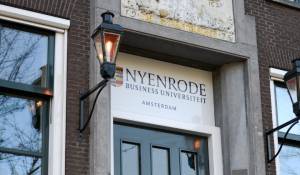Oh, the woes of an international student who wants to stay in the US after an MBA!
You’ve gotten into to a great MBA program, did well, and may even have a job offer on the table. But then you find out that getting a work visa comes down to pure luck. That’s because international students who want to stay and work in the United States for more than one year after graduating from an MBA program must secure a visa through a competitive lottery system.
But before they do that, they must find a company willing to sponsor them-- a process that's becoming increasingly difficult, since the lottery system might make some potential employers a bit skittish.
"Companies make a lot of investments in terms of their talent acquisition, and they sometimes see [international students] as a somewhat riskier strategy because they can't control the lottery issue,” says Chequeta Allen, Assistant Dean of Career Development at the University of Virginia's Darden School of Business.
“If you pursue a student who ultimately doesn't clear the lottery, then you made a lot of investments that aren't ultimately going to produce the yield of a hire."
In theory, it's not difficult for an international student to stay and work in the US for one year after finishing his or her degree. Foreigners usually study in the US on an F-1 visa, which allows them the option of obtaining a one-year Optional Practical Training (often abbreviated as OPT) visa that allows them to work in a directly related job for a year after they finish their studies.
But after the OPT year, the process becomes tricky. Students who wish to stay in the United States must try to transition to H-1B status, which allows non-Americans to work in specialty fields in the US. The government places caps on the number of H-1B visas issued per year; in 2015 the cap was 65,000 plus an additional 20,000 for students with advanced American degrees. The government received 233,000 applications for those slots, according to Linda Gentile, director of the Office of International Education at Carnegie Mellon University. The government then uses a lottery to determine who will receive those 85,000 visas.
[Read about US post-MBA visa rules as well as those in the UK, Europe, and other countries on the Article Post-MBA: The Work Visa Rundown]
The one exception to this rule? Workers in science, technology, engineering or math (STEM). The US government offers a 17-month extension to the OPT period for students graduating in these fields, a valuable policy for these students because those extra months afford them the ability to go through the H-1B lottery more than once. The STEM OPT extension was set to expire on February 12, 2016, but was extended until May 10; its fate after that is uncertain.
Even so, in general the MBA does not fit into the STEM category (with some exceptions).
Naomi Lynch, Global Sector Lead in the University of Southern California's Marshall School of Business' MBA Career Services team, agrees with Allen that the competition is tough out there.
"It's really hard for international students and they're limited in terms of fields and functions. I do not think it's getting any easier," Lynch says. "It's getting harder." She adds, "You need to be open to going home."
Lynch says one problem affecting her students this year is a low number of offers from technology firms. She says that in recent years, tech firms have tended to hire a large number of international students, but that since these firms' stock prices are down, so is hiring.
"The year's not over, but the beginning of this year we've seen a tough start to the year for tech firms in general," she says.
She adds that the entertainment jobs of southern California aren't traditionally friendly to international students, although consulting, healthcare and big banking are typically better.
Staying positive
If you’re an international student who wants to work in the US after your graduation, it’s important to be optimistic and focus on the skills you can bring to the table.
Darden student Anupam Singh pursued his bachelor's in computer science in India, then pursued his master's at Stonybrook in Long Island, New York. He jumped into his OPT period, then asked his employer, Bank of America, to sponsor him for an H1-B. Once he decided to pursue his MBA at Darden, though, he had to start over with a student visa. When he graduates from Darden in May, he plans to fight for his green card.
While Singh acknowledges that it's tough out there, he says students should focus on the unique skills they can contribute to an American company.
"When you come in, it's a tough job market," Singh says. "What I would say is, instead of thinking too much about, hey, I'm from this country and why would an American company employ me and spend so much money on lawyers and H1-B fees and fighting for a green card, instead, focus on your strengths, skill sets, and the international exposure that you bring."
Singh says that his international outlook, as well as his technological expertise, has helped him stand out in the job application pile, especially at large companies that might want to expand to the Asian markets.
He also suggests that international students gearing up for the H1-B lottery should educate themselves about rules and regulations, and prepare to ask their company to relocate them to Europe, Canada or an office in their home country, if necessary.
Singh also points out that even for students who can't find work in America, or can't secure a permanent visa, an American degree and English-language skills will come in handy anywhere.
"Say you have communication skills, you work in America for a few years, but unfortunately you can't get a visa," Singh says. "But that skill set really positions you well to succeed in your home country."













